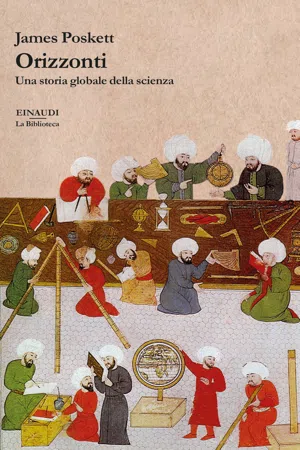INTRODUZIONE. LE ORIGINI DELLA SCIENZA MODERNA
1. Questo tipo di narrazione viene riproposto in maniera piú o meno esplicita in quasi tutte le disamine della storia della scienza moderna pubblicate a partire dalla metà del xx secolo. Tra i tanti esempi possibili cito qui Herbert Butterfield, The Origins of Modern Science, G. Bell and Sons, London 1949 [trad. it. Le origini della scienza moderna, il Mulino, Bologna 2008]; Alfred Rupert Hall, The Scientific Revolution, 1500-1800. The Formation of the Modern Scientific Attitude, Longmans, London 1954 [trad. it. La rivoluzione scientifica 1500-1800. La formazione dell’atteggiamento scientifico moderno, Feltrinelli, Milano 1981]; Richard S. Westfall, The Construction of Modern Science. Mechanisms and Mechanics, Cambridge University Press, Cambridge 1977 [trad. it. La rivoluzione scientifica del xvii secolo, il Mulino, Bologna 1984]; Steven Shapin, The Scientific Revolution, University of Chicago Press, Chicago 1996 [trad. it. La rivoluzione scientifica, Einaudi, Torino 2003]; John Gribbin, Science. A History, 1543-2001, Allen Lane, London 2002 [trad. it. L’avventura della scienza moderna. I protagonisti, le loro scoperte, le loro vite spesso straordinarie, Longanesi, Milano 2004]; Peter Bowler e Iwan Rhys Morus, Making Modern Science. A Historical Survey, University of Chicago Press, Chicago 2005; David Woottoon, The Invention of Science. A New History of the Scientific Revolution, Allen Lane, London 2015 [trad. it. La scintilla della creazione. Come le invenzioni dell’uomo hanno trasformato il mondo, il Saggiatore, Milano 2016].
2. Quello di Kapil Raj, Relocating Modern Science. Circulation and the Construction of Knowledge in South Asia and Europe, 1650-1900, Palgrave, Basingstoke 2007, è il lavoro piú affine al mio dal punto di vista degli argomenti impiegati, pur limitandosi a un’area geografica e a un periodo storico specifici (l’Asia meridionale prima del xx secolo). Anche Arun Bala, The Dialogue of Civilizations in the Birth of Modern Science, Palgrave, Basingstoke 2006, si avvicina alla mia prospettiva, ma anche in questo caso la trattazione si limita all’epoca moderna. Esistono poi altri lavori che, pur prendendo in considerazione una piú ampia area geografica, tendono semplicemente a riconfermare l’idea dell’eccezione europea, si pensi per esempio a H. Floris Cohen, The Rise of Modern Science Explained. A Comparative History, Cambridge University Press, Cambridge 2015; Toby Huff, Intellectual Curiosity and the Scientific Revolution. A Global Perspective, Cambridge University Press, Cambridge 2010; James E. McClellan III e Harold Dorn, Science and Technology in World History. An Introduction, Johns Hopkins University Press, Baltimore 20063.
3. Sulla necessità di una storia globale della scienza, si veda Sujit Sivasundaram, Sciences and the Global. On Methods, Questions, and Theory, in «Isis», CI (2010).
4. Jeffrey Mervis, NSF Rolls Out Huge Makeover of Science Statistics, in «Science», 15 gennaio 2020; Jeff Tollefson, China Declared World’s Largest Producer of Scientific Articles, in «Nature», DLIII (2018); Elizabeth Gibney, Arab World’s First Mars Probe Takes to the Skies, ivi, DLXXXIII (2020); Karen Hao, The Future of AI is in Africa, in «MIT Technology Review», 21 giugno 2019.
5. David Cyranoski e Heidi Ledford, Genome-Edited Baby Claim Provokes International Outcry, in «Nature», DLXIII (2018); David Cyranoski, Russian Biologist Plans More CRISPR-Edited Babies, ivi, DLXX (2019); Michael Le Page, Russian Biologist Still Aims to Make CRISPR Babies Despite the Risks, in «New Scientist», 3 settembre 2020; David Cyranoski, What CRISPR-Baby Prison Sentences Mean for Research, in «Nature», DLXXVII (2020); Connie Nshemereirwe, Tear Down Visa Barriers That Block Scholarship, ivi, DLXIII (2018); A Picture of the UK Workforce. Diversity Data Analysis for the Royal Society, The Royal Society, London 2014; Challenge anti-Semitism, in «Nature», DLVI (2018).
6. La celebre opera in piú volumi di Joseph Needham, Science and Civilisation in China, Cambridge University Press, Cambridge, pubblicata a partire dal 1954 [trad. it. di una parte dei volumi: Scienza e civiltà in Cina, 3 voll., Einaudi, Torino 1981-1985], celebra la scienza antica cinese ma lo fa, perlopiú, a spese di quella moderna. Seyyed Hossein Nasr, Science and Civilization in Islam, Harvard University Press, Cambridge (Mass.) 1968 [trad. it. Scienza e civiltà nell’Islam, Irfan, San Demetrio Corone 2012], fa lo stesso, ma in un solo volume, con il mondo islamico. Si veda altresí Jim Al-Khalili, Pathfinders. The Golden Age of Arabic Science, Allen Lane, London 2010 [trad. it. La casa della saggezza. L’epoca d’oro della scienza araba, Bollati Boringhieri, Torino 2019], per una nota introduzione alla scienza islamica medievale. Sulla storia e la politica dell’epoca d’oro, si veda Marwa Elshakry, When Science Became Western. Historiographical Reflections, in «Isis», CI (2010).
7. President Erdoğan Addresses 2nd Turkish. Arab Congress on Higher Education, in «Presidency of the Republic of Türkiye», 28 aprile 2016.
8. H. Butterfield, Le origini della scienza moderna cit., p. 214; James Poskett, Science in History, in «The Historical Journal», LXII (2020); Roger Hart, Beyond Science and Civilization. A Post-Needham Critique, in «East Asian Science, Technology, and Medicine», XVI (1999), p. 93; George Basalla, The Spread of Western Science, in «Science», DLVI (1967), p. 611. Gli storici della scienza del xx secolo si rifacevano a una vecchia visione orientalista risalente al xviii secolo, che identificava l’«Europa» con la «modernità» e che si consolidò in maniera significativa durante la Guerra Fredda, in particolar modo in seguito alla decolonizzazione. Si veda sul tema M. Elshakry, When Science Became Western cit.
9. M. Elshakry, When Science Became Western cit.; J. Poskett, Science in History cit.; Nathan Rosenberg e L. E. Birdzell Jr, Science, Technology and the Western Miracle, in «Scientific American», CCLXIII (1990), p. 42.
10. David Joravsky, Soviet Views on the History of Science, in «Isis», XLVI (1955), p. 7.
11. M. Elshakry, When Science Became Western cit.; Benjamin Elman, «Universal Science» Versus «Chinese Science». The Changing Identity of Natural Studies in China, 1850-1930, in «Historiography East and West», I (2003); Dhruv Raina, Images and Contexts. The Historiography of Science and Modernity in India, Oxford University Press, New Delhi 2003, in particolare le pp. 19-48, 105-38.
I. NUOVI MONDI
1. In questo capitolo ho preferito l’aggettivo «aztec...
